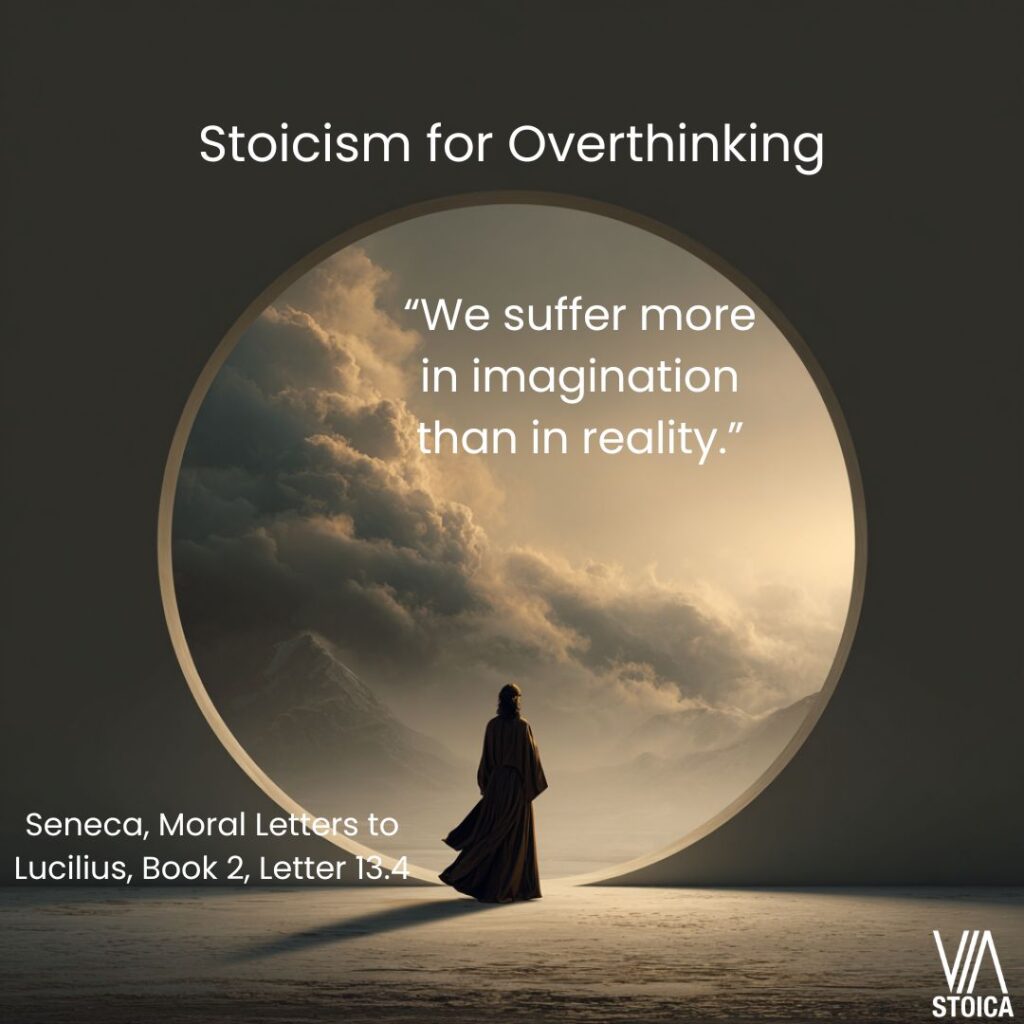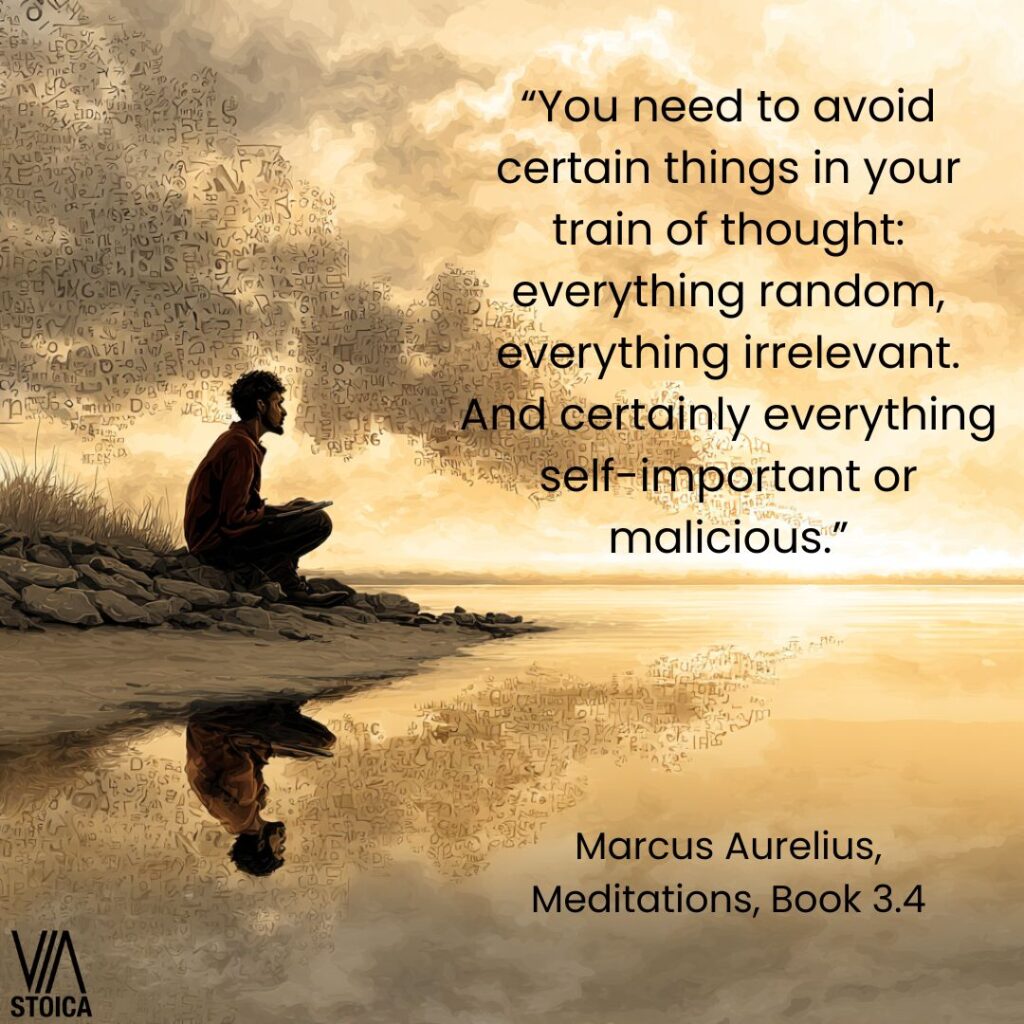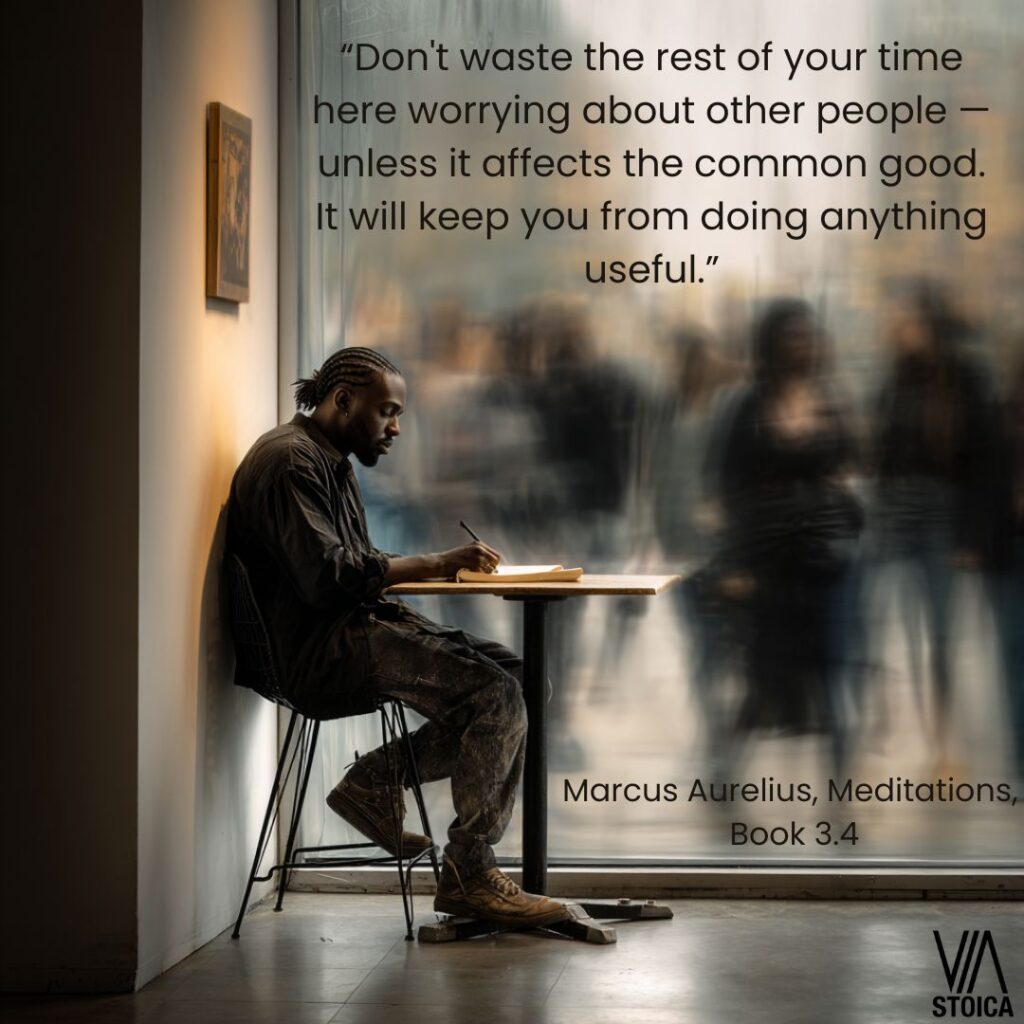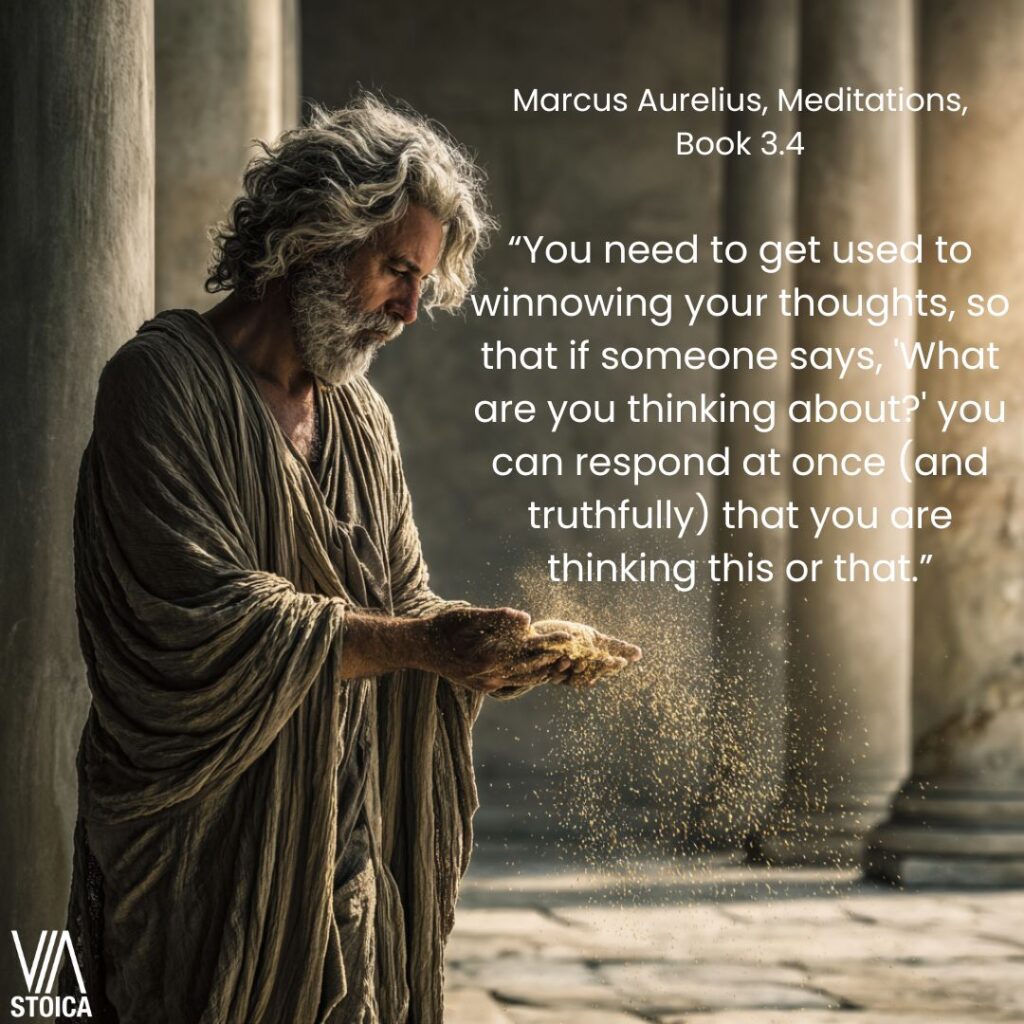Stoicism for Overthinking – Suffering Less in Imagination

Think like a Stoic
Stoicism for overthinking teaches us how to calm the mind that never stops moving. We analyze, replay, and anticipate, trying to find control through thought. Yet the more we think, the less peace we feel. Overthinking is the modern form of what the Stoics called false assent, the mind believing its own stories without first examining them.
Seneca saw this clearly almost two thousand years ago:
“We suffer more in imagination than in reality.”
Seneca, Moral Letters to Lucilius, Book 2, Letter 13.4
Much of what troubles us never happens. It unfolds only in the imagination. Stoicism teaches us to step back from this inner noise, to see our thoughts as impressions, not facts. Through practice, we can learn to think clearly without being carried away by thought itself.
2. What Overthinking Really Is
Overthinking is the habit of returning again and again to the same idea, trying to find safety in certainty. It is a mental loop, often logical on the surface but driven by fear beneath. Psychologists describe it as repetitive, unproductive thought. The Stoics would say it is unexamined assent: the moment we accept a thought as true without testing it.
Epictetus reminded his students that impressions arise constantly, but they are not commands. We choose which to believe, which to reject, and which to let pass. When we forget this, our thoughts rule us instead of serving us.
“It is not the things themselves that disturb people but their judgements about those things.”
Epictetus, Handbook, 5
Overthinking, then, is not too much thought; it is thought without reason’s guidance.
3. Overthinking and Anxiety – How They Relate
Overthinking and anxiety often feel identical, but they are different stages of the same process. Anxiety belongs to the body, overthinking to the mind. Overthinking creates imagined danger; anxiety is the feeling that follows.
When you picture future loss, failure, or judgment, the body reacts as if the image were real. The Stoics would call this a false assent, the mind agreeing with an untested appearance.
Marcus Aurelius offered a direct remedy:
“Don’t let your imagination be crushed by life as a whole. Don’t try to picture everything bad that could possibly happen. Stick with the situation at hand, and ask, ‘Why is this so unbearable?’ ‘Why can’t I endure it?’ You’ll be embarrassed to answer.”
Marcus Aurelius, Meditations, Book 8.36
This is the Stoic way to interrupt overthinking: not by silencing thoughts, but by challenging their exaggeration. Anxiety fades when we bring imagination back to what is real and present.
4. The Stoic Understanding of Overthinking

In Stoicism, overthinking is a pathos, a disturbance caused by false judgment. The process begins with phantasia (impression), then comes assent (synkatathesis), when we decide whether that impression is true. When we assent too quickly, imagination turns to belief and belief to emotion.
Overthinking is this chain left unchecked. It is not the presence of thoughts that harms us, but our surrender to them.
Marcus Aurelius teaches mental clarity through conscious selection:
“You need to avoid certain things in your train of thought: everything random, everything irrelevant. And certainly everything self-important or malicious.”
Marcus Aurelius, Meditations, Book 3.4
Right thought is not about constant analysis but careful attention. The Stoic mind filters; it does not flood.
5. A Core Stoic Principle That Transforms Overthinking
The Discipline of Assent is the Stoic practice of testing impressions before believing them. It begins with awareness: noticing a thought before you identify with it.
Epictetus taught:
“Practice, then, from the start to say to every harsh impression, ‘You are an impression, and not at all the thing you appear to be.’ Then examine it and test it by these rules which you have, and firstly, and chiefly, by this: Whether the impression has to do with things which are up to us, or those which are not, and, if it has to do with things that are not up to us, be ready to reply. ‘It is nothing to me’.”
Epictetus, The Handbook, 1
Marcus adds what this looks like in daily life:
“You need to get used to winnowing your thoughts, so that if someone says, ‘What are you thinking about?’ you can respond at once (and truthfully) that you are thinking this or that. And it would be obvious from your answer that your thoughts were straightforward and considerate ones.”
Marcus Aurelius, Meditations, Book 3.4
When we slow down this process of assent, thought becomes conscious. Instead of reacting, we can choose.
6. Stoic Practices to Overcome Overthinking
1. The Dichotomy of Control
Separate what is up to you from what is not. Your judgments, desires, and actions are yours; outcomes are not.
“Some things are up to us, and some are not.”
Epictetus, Handbook, 1
When you remember this, overthinking loses its purpose.
2. Prosochē – Attention to the Present
Return to what is before you.
“Don’t waste the rest of your time here worrying about other people — unless it affects the common good. It will keep you from doing anything useful.”
Marcus Aurelius, Meditations, Book 3.4
Attention clears the fog of unnecessary thought.

3. Premeditatio Malorum – Negative Visualization
Visualize potential difficulties calmly, not fearfully. Then remind yourself you can endure them.
“Don’t let your imagination be crushed by life as a whole… Stick with the situation at hand.”
Marcus Aurelius, Meditations, Book 8.36
This teaches resilience, not worry. It reminds you that you will be able to handle the situation when and if it comes. But don’t let this practice take control; set its limits. And then focus on the present situation.
4. Winnowing Thoughts (Daily Reflection)
At day’s end, review your thoughts as Marcus advised:
“Four habits of thought to watch for, and erase from your mind when you catch them. Tell yourself:
Marcus Aurelius, Meditations, Book 11.19
– This thought is unnecessary.
– This one is destructive to the people around you.
– This one is insincere — not what you really think.
– And the fourth: that the more divine part of you has been beaten and subdued by the degraded mortal part.”
Mental clarity begins with noticing which thoughts deserve your attention.
5. The Evening Pause
Before sleep, ask: Which thoughts today were mine, and which were fear?
This simple reflection turns overthinking into awareness.
7. From Overthinking to Tranquility
Overthinking loses power when you stop treating every thought as truth. Each moment of mental noise becomes an opportunity to practice awareness.
Marcus reminds us:
“Don’t waste the rest of your time here worrying about other people — unless it affects the common good.”
Marcus Aurelius, Meditations, Book 3.4
True freedom is the ability to direct the mind toward what matters. Stoicism does not ask us to think less, but to think better, with reason, perspective, and purpose.
Seneca’s line still echoes across time:
“We suffer more in imagination than in reality.”
To suffer less, we must live more in what is real.
8. FAQ Section
How is overthinking different from anxiety?
Overthinking belongs to the mind; it’s a repetitive thought. Anxiety belongs to the body; it’s the feeling that follows. Stoicism helps by addressing the thought before it turns into emotion.
Which Stoic practice helps most with overthinking?
The Discipline of Assent. Learning to test impressions stops the chain that turns imagination into fear.
Is Stoicism about avoiding thoughts or controlling them?
Neither. It is about examining thoughts and keeping only those aligned with reason and virtue.
How does this connect to modern psychology?
Cognitive Behavioral Therapy was inspired by Stoic philosophy. Both teach that how we think determines how we feel.
Can beginners use these practices right away?
Yes. Start with awareness, notice your thoughts without judgment. That alone is the first Stoic step toward freedom.

9. Final Reflection
The Stoics knew the mind’s greatest struggle is with itself. To think clearly is not to eliminate thought, but to guide it. When you learn to pause before believing every impression, overthinking becomes a path to awareness.
Calm is not emptiness; it is the harmony between thought and reason.
Want to Explore More Stoic Practices?
Book a free consultation with one of our Stoic Coaches to get support. Or read more about Stoicism for Everyday Life. Listen to The Via Stoica Podcast on Spotify, Apple Podcasts, or YouTube.
Author Bio
Benny Voncken is the co-founder of Via Stoica, where he helps people apply Stoic philosophy to modern life. He is a Stoic coach, writer, and host of The Via Stoica Podcast. With nearly a decade of teaching experience and daily Stoic practice, Benny creates resources, workshops, and reflections that make ancient wisdom practical today.
Related Posts
-
 Inner Life Terms
Inner Life TermsWhat Are Values? Principles That Guide Action and Display Nature
What are Values? Most people don’t wake up thinking about their values. They notice them indirectly, when something feels slightly misaligned. When a choice looks right on paper but leaves a faint sense of resistance. When success arrives, yet doesn’t land the way it was expected to. Values are often mistaken for opinions, preferences, or […]
Read more -
 Via Stoica Podcast
Via Stoica PodcastA Stoic Conversation with Jason Nelson: Six Seeds for a Happier Life
What if happiness is not something you achieve one day, but something you practice every day? In A Balm for Your Soul: Six Seeds for Happiness, Jason Nelson offers a grounded and humane answer to a question many people quietly struggle with: Why does life still feel off, even when things look good on paper?Rather […]
Read more -
 Greek Stoic Philosophy Terms
Greek Stoic Philosophy TermsWhat Is Philanthropia? How Stoicism Views Love for Humankind
What Is Philanthropia? Philanthropia in Stoicism is the cultivated disposition to care for human beings simply because they are human. It describes a rational, practiced goodwill toward others that flows from understanding our shared nature, rather than from emotion, obligation, or reward. This concept matters today because modern life often treats kindness as optional, sentimental, […]
Read more


Comments 0